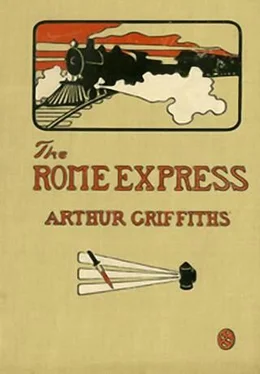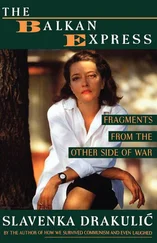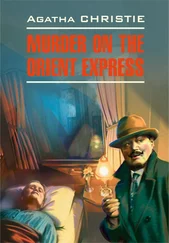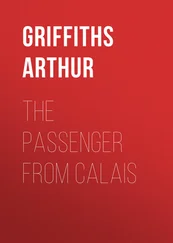Arthur Griffiths - The Rome Express
Здесь есть возможность читать онлайн «Arthur Griffiths - The Rome Express» весь текст электронной книги совершенно бесплатно (целиком полную версию без сокращений). В некоторых случаях можно слушать аудио, скачать через торрент в формате fb2 и присутствует краткое содержание. Жанр: Детектив, на английском языке. Описание произведения, (предисловие) а так же отзывы посетителей доступны на портале библиотеки ЛибКат.
- Название:The Rome Express
- Автор:
- Жанр:
- Год:неизвестен
- ISBN:нет данных
- Рейтинг книги:3 / 5. Голосов: 1
-
Избранное:Добавить в избранное
- Отзывы:
-
Ваша оценка:
- 60
- 1
- 2
- 3
- 4
- 5
The Rome Express: краткое содержание, описание и аннотация
Предлагаем к чтению аннотацию, описание, краткое содержание или предисловие (зависит от того, что написал сам автор книги «The Rome Express»). Если вы не нашли необходимую информацию о книге — напишите в комментариях, мы постараемся отыскать её.
The Rome Express — читать онлайн бесплатно полную книгу (весь текст) целиком
Ниже представлен текст книги, разбитый по страницам. Система сохранения места последней прочитанной страницы, позволяет с удобством читать онлайн бесплатно книгу «The Rome Express», без необходимости каждый раз заново искать на чём Вы остановились. Поставьте закладку, и сможете в любой момент перейти на страницу, на которой закончили чтение.
Интервал:
Закладка:
"This is a new light," the Judge confessed. "Do you draw any conclusion from it?" he went on to ask the General.
"That is surely your business. I have only elicited the fact to disprove your theory. But if you wish, I will tell you how it strikes me."
The Judge bowed assent.
"The bare fact that the train was halted would mean little. That would be the natural act of a timid or excitable person involved indirectly in such a catastrophe. But to disavow the act starts suspicion. The fair inference is that there was some reason, an unavoidable reason, for halting the train."
"And that reason would be-"
"You must see it without my assistance, surely! Why, what else but to afford some one an opportunity to leave the car."
"But how could that be? You would have seen that person, some of you, especially at such a critical time. The aisle would be full of people, both exits were thus practically overlooked."
"My idea is-it is only an idea, understand-that the person had already left the car-that is to say, the interior of the car."
"Escaped how? Where? What do you mean?"
"Escaped through the open window of the compartment where you found the murdered man."
"You noticed the open window, then?" quickly asked the detective. "When was that?"
"Directly I entered the compartment at the first alarm. It occurred to me at once that some one might have gone through it."
"But no woman could have done it. To climb out of an express train going at top speed would be an impossible feat for a woman," said the detective, doggedly.
"Why, in God's name, do you still harp upon the woman? Why should it be a woman more than a man?"
"Because"-it was the Judge who spoke, but he paused a moment in deference to a gesture of protest from M. Flocon. The little detective was much concerned at the utter want of reticence displayed by his colleague.
"Because," went on the Judge with decision-"because this was found in the compartment;" and he held out the piece of lace and the scrap of beading for the General's inspection, adding quickly, "You have seen these, or one of them, or something like them before. I am sure of it; I call upon you; I demand-no, I appeal to your sense of honour, Sir Collingham. Tell me, please, exactly what you know."
CHAPTER X
The General sat for a time staring hard at the bit of torn lace and the broken beads. Then he spoke out firmly: "It is my duty to withhold nothing. It is not the lace. That I could not swear to; for me-and probably for most men-two pieces of lace are very much the same. But I think I have seen these beads, or something exactly like them, before."
"Where? When?"
"They formed part of the trimming of a mantle worn by the Contessa di Castagneto."
"Ah!" it was the same interjection uttered simultaneously by the three Frenchmen, but each had a very different note; in the Judge it was deep interest, in the detective triumph, in the Commissary indignation, as when he caught a criminal red-handed.
"Did she wear it on the journey?" continued the Judge.
"As to that I cannot say."
"Come, come, General, you were with her constantly; you must be able to tell us. We insist on being told." This fiercely, from the now jubilant M. Flocon.
"I repeat that I cannot say. To the best of my recollection, the
Countess wore a long travelling cloak-an ulster, as we call them. The jacket with those bead ornaments may have been underneath. But if I have seen them,-as I believe I have,-it was not during this journey."
Here the Judge whispered to M. Flocon, "The searcher did not discover any second mantle."
"How do we know the woman examined thoroughly?" he replied. "Here, at least, is direct evidence as to the beads. At last the net is drawing round this fine Countess."
"Well, at any rate," said the detective aloud, returning to the General, "these beads were found in the compartment of the murdered man. I should like that explained, please."
"By me? How can I explain it? And the fact does not bear upon what we were considering, as to whether any one had left the car."
"Why not?"
"The Countess, as we know, never left the car. As to her entering this particular compartment,-at any previous time,-it is highly improbable. Indeed, it is rather insulting her to suggest it."
"She and this Quadling were close friends."
"So you say. On what evidence I do not know, but I dispute it."
"Then how could the beads get there? They were her property, worn by her."
"Once, I admit, but not necessarily on this journey. Suppose she had given the mantle away-to her maid, for instance; I believe ladies often pass on their things to their maids."
"It is all pure presumption, a mere theory. This maid-she has not as yet been imported into the discussion."
"Then I would suggest that you do so without delay. She is to my mind a-well, rather a curious person."
"You know her-spoke to her?"
"I know her, in a way. I had seen her in the Via Margutta, and I nodded to her when she came first into the car."
"And on the journey-you spoke to her frequently?"
"I? Oh, dear, no, not at all. I noticed her, certainly; I could not help it, and perhaps I ought to tell her mistress. She seemed to make friends a little too readily with people."
"As for instance-?"
"With the porter to begin with. I saw them together at Laroche, in the buffet at the bar; and that Italian, the man who was in here before me; indeed, with the murdered man. She seemed to know them all."
"Do you imply that the maid might be of use in this inquiry?"
"Most assuredly I do. As I tell you, she was constantly in and out of the car, and more or less intimate with several of the passengers."
"Including her mistress, the Countess," put in M. Flocon.
The General laughed pleasantly. "Most ladies are, I presume, on intimate terms with their maids. They say no man is a hero to his valet. It is the same, I suppose, with the other sex."
"So intimate," went on the little detective, with much malicious emphasis, "that now the maid has disappeared lest she might be asked inconvenient questions about her mistress."
"Disappeared? You are sure?"
"She cannot be found, that is all we know."
"It is as I thought, then. She it was who left the car!" cried Sir Charles, with so much vehemence that the officials were startled out of their dignified reserve, and shouted back almost in a breath: "Explain yourself. Quick, quick. What in God's name do you mean?"
"I had my suspicions from the first, and I will tell you why. At Laroche the car emptied, as you may have heard; every one except the Countess, at least, went over to the restaurant for early coffee; I with the rest. I was one of the first to finish, and I strolled back to the platform to get a few whiffs of a cigarette. At that moment I saw, or thought I saw, the end of a skirt disappearing into the sleeping-car. I concluded it was this maid, Hortense, who was taking her mistress a cup of coffee. Then my brother came up, we exchanged a few words, and entered the car together."
"By the same door as that through which you had seen the skirt pass?"
"No, by the other. My brother went back to his berth, but I paused in the corridor to finish my cigarette after the train had gone on. By this time every one but myself had returned to his berth, and I was on the point of lying down again for half an hour, when I distinctly heard the handle turned of the compartment I knew to be vacant all through the run."
"That was the one with berths 11 and 12?"
"Probably. It was next to the Countess. Not only was the handle turned, but the door partly opened-"
"It was not the porter?"
"Oh, no, he was in his seat,-you know it, at the end of the car,-sound asleep, snoring; I could hear him."
Читать дальшеИнтервал:
Закладка:
Похожие книги на «The Rome Express»
Представляем Вашему вниманию похожие книги на «The Rome Express» списком для выбора. Мы отобрали схожую по названию и смыслу литературу в надежде предоставить читателям больше вариантов отыскать новые, интересные, ещё непрочитанные произведения.
Обсуждение, отзывы о книге «The Rome Express» и просто собственные мнения читателей. Оставьте ваши комментарии, напишите, что Вы думаете о произведении, его смысле или главных героях. Укажите что конкретно понравилось, а что нет, и почему Вы так считаете.












